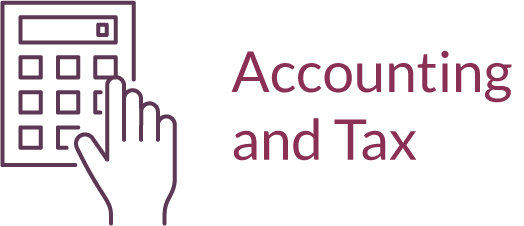
When we consult business owners about Accounting and Tax, they often tell us that they wish they could easily calculate the potential consequences and implications of making a big decision or hiring more employees. Having an accountant as your financial advisor to help you with budgeting and monitoring cash flow on a steady basis will allow you to navigate any hurdles that occur in real-time.
About Accounting and Tax
You should take a collaborative approach with your accountant, allowing you to make decisions together based on the latest data and also take advantage of a consultative relationship that will help you make business decisions when you need to make them.
In the fields of taxation and financial reporting, our professional team is dedicated to delivering meticulous attention to detail and comprehensive solutions to ensure your financial compliance and optimization. With profound expertise and extensive practical experience, our experts are adept at navigating complex tax regulations and financial standards. Whether you require assistance with tax planning, compliance, or financial reporting, we offer tailored solutions to meet your unique needs and facilitate sustained growth. Partner with us today, and we will assist you in formulating robust budgets and monitoring cash flow to tackle any real-time challenges that may arise. Our team’s expertise and experience will provide invaluable support to your business, enabling you to make informed financial decisions, maintain sound financial health, and confidently achieve your financial goals!
Accounting & Tax
- Tax Returns for Individuals and Businesses
- Tax Returns for Self Managed Superannuation Funds
- Preparation of Annual Financial Accounts
- Preparation of BAS and IAS
- Preparation of Fringe Benefits Tax Returns
- Taxable payments annual report
- Payment Summaries
- Payroll Tax
- Workcover
- Business Registrations
- Assistance with Superannuation reporting
- Tax Planning
- Cashflow Budgeting and Profit Forecasting
- Benchmarking and Analysis
- ASIC Corporate compliance

WISELINK ACCOUNTANTS – the best accounting and taxation agency based in Camberwell, Victoria and South Brisbane , QLD offers a wide range of consulting services to serve a variety of businesses and clients.
Whether you’re a small, local business or a multinational corporation, we can help you reach new levels of success.
Get in touch with us today to learn more about our services and what our team can do for you.
Accounting and Tax in Victoria Australia
Accounting and Tax practices in Victoria, Australia, involve the application of local, state, and federal laws to manage financial records and ensure compliance with taxation regulations. Here’s an overview of the key aspects of accounting & tax:
Accounting in Australia
- Financial Reporting: Businesses and organizations in Victoria must prepare financial statements, including balance sheets, income statements, and cash flow statements, in accordance with Australian Accounting Standards (AAS). These standards ensure consistency, transparency, and accuracy in financial reporting.
- Bookkeeping: This involves the daily recording of financial transactions, maintaining accurate records of income, expenses, and other financial activities.
- Auditing: Independent auditors examine financial statements and records to provide assurance that they are accurate and comply with relevant laws and regulations.
- Management Accounting: This involves preparing internal reports to assist management in decision-making, planning, and controlling business operations.
- Taxation Compliance: Accountants ensure that businesses and individuals comply with tax laws, preparing and filing tax returns, and advising on tax planning strategies.
- Payroll Services: Managing employee payroll, including calculating wages, withholding taxes, and ensuring compliance with employment laws and regulations.
Taxation in Victoria
- Income Tax: Individuals and businesses in Victoria must pay income tax to the federal government. The Australian Taxation Office (ATO) administers the tax system, which includes filing annual tax returns and paying any taxes owed.
- Goods and Services Tax (GST): A 10% tax on most goods and services sold in Australia. Businesses with an annual turnover of $75,000 or more must register for GST, collect it from customers, and remit it to the ATO.
- Payroll Tax: A state tax on wages paid by employers. In Victoria, businesses with a payroll exceeding a certain threshold must pay payroll tax to the state government.
- Stamp Duty: A state tax on certain transactions, including the transfer of real estate, motor vehicles, and other assets. The amount varies depending on the type and value of the transaction.
- Land Tax: An annual tax on land ownership, payable by owners of land that exceeds a certain value. The rates and thresholds vary depending on the type and use of the land.
- Capital Gains Tax (CGT): Tax on the profit made from selling assets, such as property or shares. While CGT is part of the income tax system, there are specific rules and concessions that apply.
- Fringe Benefits Tax (FBT): Tax on non-cash benefits provided to employees, such as company cars or private health insurance. Employers must calculate and pay FBT annually.
Key Regulatory Bodies
- Australian Taxation Office (ATO): The primary body responsible for administering federal taxes, including income tax, GST, and FBT.
- Victorian State Revenue Office (SRO): Manages state taxes such as payroll tax, stamp duty, and land tax.
- Australian Securities and Investments Commission (ASIC): Regulates companies and financial services, ensuring compliance with laws to protect consumers, investors, and creditors.
- CPA Australia and Chartered Accountants Australia and New Zealand (CA ANZ): Professional bodies that provide accreditation, support, and guidelines for accountants in Victoria.
Compliance and Legal Framework
- Corporations Act 2001: Governs company law in Australia, including the duties of company directors and financial reporting requirements.
- Tax Administration Act 1953: Outlines the administration of the Australian taxation system.
- Income Tax Assessment Act 1936 and 1997: Provide the framework for calculating and paying income tax.
- Goods and Services Tax Act 1999: Governs the administration of the GST.
By adhering to these accounting and taxation principles and regulations, businesses and individuals in Victoria can ensure they remain compliant, minimize their tax liabilities, and make informed financial decisions.







